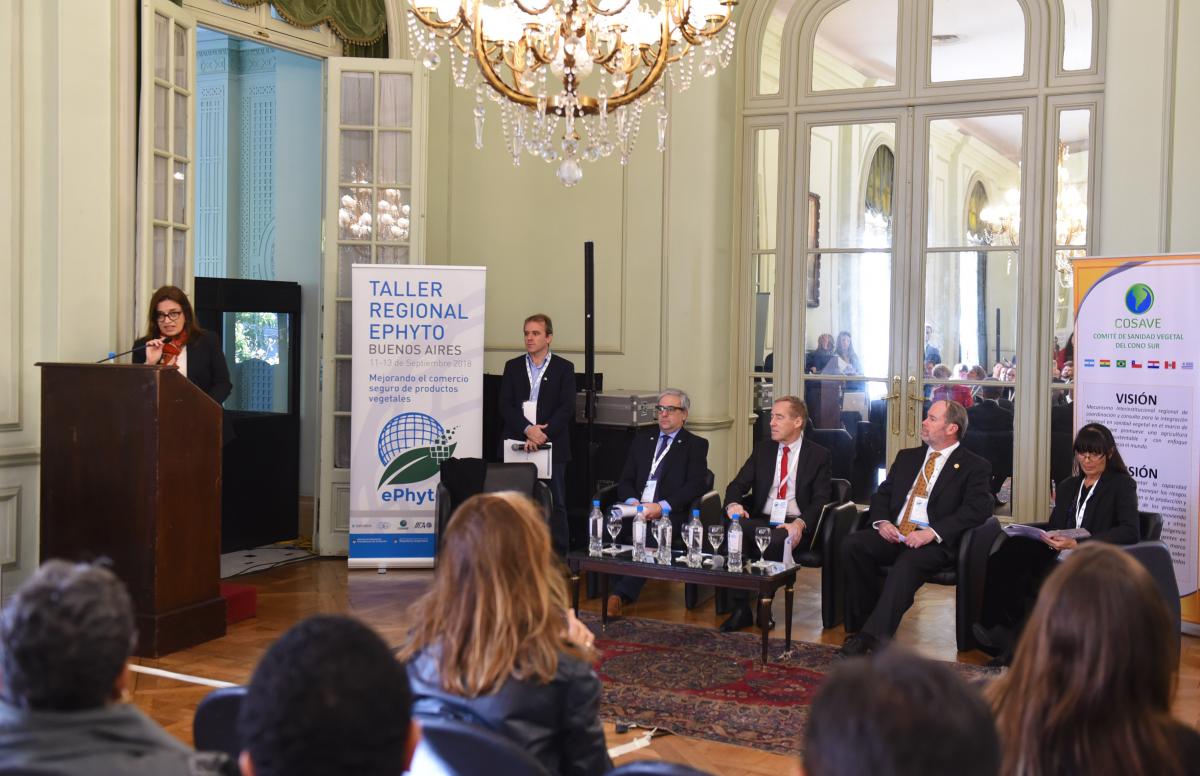Argentina and Australia seek to expand regional cooperation on ePhyto

Buenos Aires, 13 September 2018 (IICA). This week, representatives from 22 countries attend a regional workshop in Buenos Aires, organized by the governments of Argentina and Australia. The event which has been co-sponsored by the Inter-American Institute for Cooperation on Agriculture (IICA) and the Southern Cone Plant Health Committee (COSAVE) focuses on the issue of electronic phytosanitary certification (ePhyto) - an essential tool in international trade facilitation.
The ePhyto project is an initiative of the International Plant Protection Convention that is seeking to harmonize standards, to develop a generic national system and to implement a global hub to exchange certificates, with a view to making trade in products of plant origin more streamlined and secure.
In his remarks at the opening of the workshop at Palacio San Martín – headquarters of the Ministry of Foreign Affairs - Robert Ahern, IICA’s Director of Agricultural Health and Food Safety (AHFS) maintained that the ePhyto initiative, “is the most significant achievement in recent years to address the issue of improving trade via electronic certification”, in particular for countries in the Americas, for whom “trade in agricultural products constitutes the basis of development”.
The workshop, entitled “Experience Sharing in Electronic Phytosanitary Certification Systems” brings together experts from Belize, Bolivia, Brazil, Chile, Colombia, Costa Rica, Cuba, Dominican Republic, Ecuador, El Salvador, Guatemala, Mexico, Nicaragua, Panama, Paraguay, Peru, Uruguay, United States, Canada and Vietnam.
The governments of Argentina and Australia organized the regional seminar, with a view to sharing expertise acquired from the ePhyto bilateral cooperation program.
“This event will provide knowledge on new technical elements”, underscored the Director of Bilateral Cooperation in the Ministry of Foreign Affairs, Andrea Rosconi, in welcoming the participants. “We hope that these projects demonstrate that our focus need not merely be bilateral, but that it can be regional and even extra-regional. The support of our partners has been vital. Without them, we would never have had such a high level of attendance at this workshop”.
Also speaking at the opening, Noel Campbell, Ambassador of Australia to Argentina, stressed that both countries, “stand to play a leadership role in the ePhyto pilot program, as well as in improving the primary responsibilities and capacities of their regional neighbours through the work of organizations”, such as the Asia-Pacific Plant Protection Commission and COSAVE.
Finally, Diego Quiroga, the Director of Plant Protection of the National Service for Agrifood Health and Quality (SENASA for its Spanish acronym), emphasized that COSAVE has committed to electronic phytosanitary certification and it also on the agenda of the ministers that sit on the Southern Agricultural Council (CAS). He commented that, “the private sector is critical to this process, given that the export sector is an e-Phyto user”.
Electronic phytosanitary certification reduces the risk of fraudulent documents, improves efficiency and expedites the clearance process in international trade.
It is also considered to be a tool that enables countries to implement some of the measures that were committed to under the WTO Trade Facilitation Agreement.
Argentina, Australia, New Zealand, Holland, Canada and the United States are benchmark countries, which have introduced electronic phytosanitary certification in accordance with standards established by international organizations.
The working days feature presentations by SENASA; Australia’s Department of Agriculture; the World Trade Organization (WTO); the International Plant Protection Convention; the United Nations International Computing Center (UNICC); the Cámara de Industria Aceitera de la República Argentina – CIARA (Argentine Oil Industry Chamber), and online presentations by the companies - Cargill and Edox.
More information:
Sonia Novello, Communication Specialist – IICA Delegation in Argentina